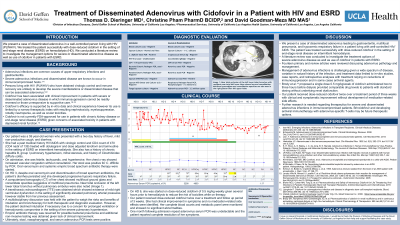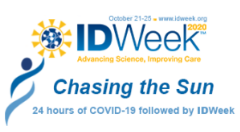Category: Virology: Studies of Treatment and Prevention of Viral Infections
Poster Session: Virology: Studies of Treatment and Prevention of Viral Infections
1705 - Treatment of Disseminated Adenovirus with Cidofovir in a Patient with HIV and ESRD


Thomas D. Dieringer
Infectious Diseases Fellow
University of California Los Angeles
Los Angeles, CaliforniaDisclosure: I do not have any relevant financial / non-financial relationships with any proprietary interests.

Christine Pham
Infectious Diseases Clinical Pharmacist
University of California, Los Angeles; David School of Medicine/University of California, Los Angeles
Los Angeles, CaliforniaDisclosure: I do not have any relevant financial / non-financial relationships with any proprietary interests.
- DG
David Goodman-Meza
Assistant Professor
UCLA
Los Angeles, CaliforniaDisclosure: I do not have any relevant financial / non-financial relationships with any proprietary interests.
Presenting Author(s)
Co-Author(s)
Background:
Adenovirus is a common cause of upper respiratory infections and gastroenteritis. Severe adenovirus infections and disseminated disease are known to occur in immunocompromised hosts. Cidofovir has been associated with clinical improvement in patients with severe or disseminated disease in which immunosuppression cannot be readily reversed or those unresponsive to supportive care. However, a narrow therapeutic index has limited its clinical use particularly in patients with end-stage renal disease (ESRD).
Methods:
We present a case of disseminated adenovirus in a well-controlled person living with HIV (PLWHIV) treated successfully with dose-reduced cidofovir in the setting of ESRD on hemodialysis (HD) at the University of California Los Angeles. A literature review was conducted to investigate the treatment of severe adenovirus disease and use of cidofovir in patients with ESRD.
Results:
Our patient is a 59 year-old woman who presented with fever, non-productive cough, and diarrhea. She is living with HIV/AIDS with virologic control and CD4 count of 470 treated with dose adjusted lamivudine, tenofovir alafenamide, and dolutegravir in the setting of ESRD on HD, chronic hepatitis B, and group I pulmonary hypertension. Her course was complicated by development of multifocal pneumonia with hypoxemic respiratory failure requiring high-flow nasal cannula. Adenovirus PCR was detected in stool, respiratory, and serum samples. Given high risk intubation, dose-reduced cidofovir 0.5 mg/kg weekly was given twice over three weeks with symptomatic improvement, elimination of serum adenovirus DNA, and without development of adverse medication-related effects.
Sixteen primary and review articles were identified discussing adenovirus pathology and treatment. A single pharmacokinetic study outlined a dosing regimen for cidofovir of 0.5 mg/kg weekly which provided comparable serum drug levels in asymptomatic patients with ESRD on HD compared to controls with adequate renal function.
Conclusion:
This case report illustrates although there is limited data to establish the efficacy and safety of cidofovir for treatment of disseminated adenovirus infections in ESRD patients, dose-reduced cidofovir 0.5 mg/kg weekly while on HD appears to have been effective and well tolerated.

